
The Centers for Disease Control and Prevention is shown, March 15, 2020, in Atlanta. The current strain of bird flu has been detected in wild birds and poultry, as well as mammals like cows.
(AP Photo/John Bazemore, File)
Health officials have identified a person in Missouri sick with bird flu despite having no known contact with animals — marking the first case of the virus in the U.S. this year not linked to farm work.
Bird flu has been slowly spreading across the nation's farms since the beginning of spring. So far, there have been 14 human cases of the virus. All the patients — except the one from Missouri — had been linked to sick dairy cows or poultry.
The Centers for Disease Control and Prevention said Friday that the Missouri patient was hospitalized and treated with influenza antiviral medications. The patient has since recovered and been discharged. The agency added that the virus did not appear to have spread to the patient's close contacts.
Aside from Missouri, human cases have been reported in Texas, Michigan and Colorado. At least 196 dairy cattle herds as well as 56 commercial and backyard poultry flocks have been infected nationwide, according to the CDC.
There are no known bird flu outbreaks in cattle in Missouri, the CDC said. But there have been outbreaks in commercial and backyard poultry flocks in the state this year. In previous years, bird flu has been detected in wild birds in that state.
The CDC said its current risk assessment of bird flu to the general public "remains low." It said "there has been no sign of unusual influenza activity in people, including in Missouri."
The agency recommends that people avoid contact with sick or dead animals — regardless of whether the animals are wild or domesticated. The CDC also warns against drinking raw milk, adding that pasteurization kills the virus and pasteurized milk is safe to drink.
 DONATE
DONATE






 Support WFYI. We can't do it without you.
Support WFYI. We can't do it without you.